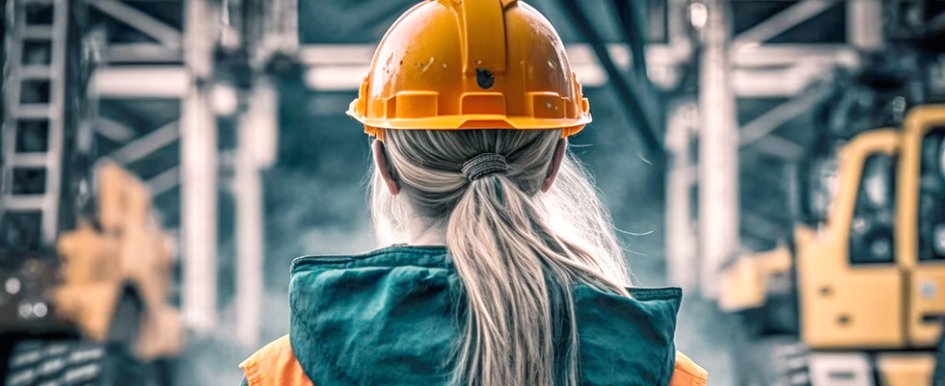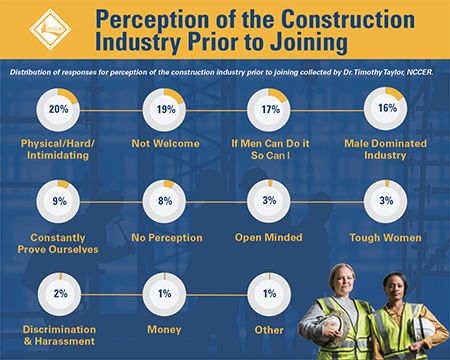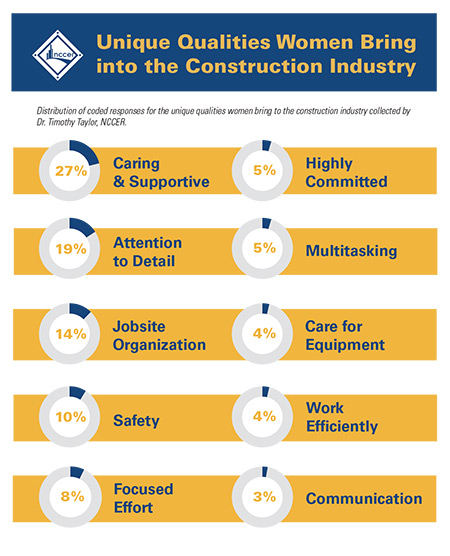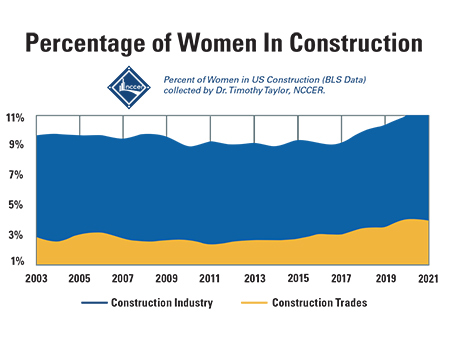
We need more of the right people for the construction industry to keep pace with project demand.
Statistics show that for every four people leaving the industry, only one enters. But keeping up is not just
about numbers.
Recent research shows that women bring unique qualities to the jobsite that will help contractors improve project outcomes.
The National Center for Construction Education and Research (NCCER) conducted focus groups in 2022 with 176 tradeswomen in the U.S. and Canada and gathered information from project management teams in separate focus groups. In addition, NCCER analyzed survey responses from 770 additional women in construction. This was followed by a 2023 survey conducted by Ambition Theory, a professional coaching and leadership development company, in collaboration with NCCER.
The research revealed several reasons that contractors should consider hiring more women.
1. Improve Productivity
Three strengths, which contribute to improved productivity, were identified in the research.
1. Attention to detail and following established processes.
Women tend to be more careful in executing their tasks with the required detailed specifications, which was mentioned in 69% of the focus groups. These qualities were corroborated by members of project management teams who participated in separate focus groups. One participant said: “Women are more likely to be perfectionists. We’re way more likely to double check our own work. Another thing we bring to the table is the ability to follow process and pay attention to details.”
Management team members agreed, stating that women are focused on following the prescribed work process as designed instead of relying on experience and physical strength.
2. Maintaining organized jobsites and taking care of equipment.
It’s well known that downtime on the job is one of the factors that contributes to cost and schedule overruns. Often this is due to things beyond the individual field worker’s control, such as late delivery of materials or equipment, project data resolution or coordination with other trades.
However, consider how much time is spent on a daily basis with gathering tools and materials, something that the individual worker does have control over.
Keeping things organized in the workspace, ensuring cleanup after work is done, and taking care in using and maintaining tools and equipment are strengths women bring, as mentioned in 45% of focus groups and identified in 14% of all responses.
3. Prioritizing safety.
Both of these qualities in turn can result in positive effects on safety. Additionally, concern for following safety protocols was a high priority for women, often because they feel they have a duty to their families. This concern made up 10% of all responses and was mentioned in 45% of focus groups. Several focus group participants stated that they are willing to think twice before acting and encourage their co-workers to do the same.
One participant in the management focus group said: “Women are role model workers. They want to work safely. They follow process and procedure. Generally, I find that [women adhere] better to compliance and HSE process and procedures.”

2. Increase Team Performance & Satisfaction
The most prevalent quality identified in the collective research is that women are team focused. According to 27% of all responses and 59% of focus groups: Women tend to have personalities that make them compassionate toward their co-workers, more likely to engage in teamwork, lift up morale, help their co-workers and offer them support.
One manager described the creation of cohesive teams when women were part of the crew.
“Being a person on-site that men and women can confide in is something that employers really value. [Women help to] create the family within the team,” said a senior project manager for a large industrial project. Additional data affirms the positive impact tradeswomen have on overall crew performance.
A survey of 2,780 construction craft professionals asked respondents to rate their personal performance record (including safety, attendance, quality, productivity and initiative) for the previous year.
Respondents with at least one woman on their work crew reported higher individual performance than those in all-male crews, and the difference was statistically significant (Construction Industry Institute RT-370).
This correlates with the focus groups’ identification of teamwork being a benefit women bring to project sites.
The women emphasized that many of their male colleagues were largely focused on personal and individual achievements rather than the overall performance of the crew.
In contrast, women were more focused on making sure the entire team was functioning at a high level rather than on their own individual achievement.
This type of support spreads beyond the technical aspects of the job and into the emotional health of the team. With the increased awareness and focus on mental health, this type of positive impact on crew dynamics can have lasting effects beyond the project site. Said one participant: “I like the way that people have each other’s back. I see people being there for each other, especially in your own trade.”

3. Fill the Leadership Pipeline
Traditionally, the people who exhibited the best craft skills were the people who moved into field leadership positions.
The problem with that is there are other skills needed to be a good leader. They are required to assign work, maintain and supervise work progress, verify proper safety practices and develop look-ahead schedules. Additionally, they are expected to be leaders that are fair, motivational and ethical. Making sure you have the right person in that position requires being intentional with selecting and training crew leaders.
Based on the research, we have already established that women excel at adhering to policy, prioritizing safety and encouraging team collaboration. The research also revealed that women possess better communication skills, as noted by 17% of the focus groups.
Perhaps more importantly, women take pride in their work and are highly committed to their jobs.
In fact, a 2023 follow-up survey conducted by Ambition Theory and NCCER found that women want to be leaders. About two-thirds of these survey respondents were craft professionals and operations personnel. The rest were site managers or administrators.
This survey found that salary was a priority for women getting started in the industry, but that those with a year or more of experience unequivocally ranked career advancement as the most important thing to them professionally.
As many as 88% are already in or would like to be in a leadership role during their careers, yet 72% have never or rarely had a female manager or supervisor.
According to an Ambition Theory training participant: “Women in construction are often told to get more field experience and that we should know how to do every task and operate every piece of equipment before we can become a manager, even though men aren’t expected to prove they can do this before they’re promoted to leadership.”

Next Steps
The goal of this research was to highlight the unique benefits women bring to the construction craft workforce so that contractors recognize more of what they might be missing.
There is a direct negative impact on project outcomes by having an industry that is made primarily of men (89% men in the overall industry and 96.1% in construction trades). But we also sought out the obstacles that women encounter when trying to join the construction workforce, and what causes them to leave so that contractors could make specific changes to encourage greater female participation.
The report discusses addressing discrimination and sexual harassment, ensuring consistent hiring practices, offering training opportunities and leadership development, and finding ways to accommodate the needs of family caregivers. The white paper “In Her Own Words: Improving Project Outcomes” can be downloaded at nccer.org/research/in-her-own-words.
